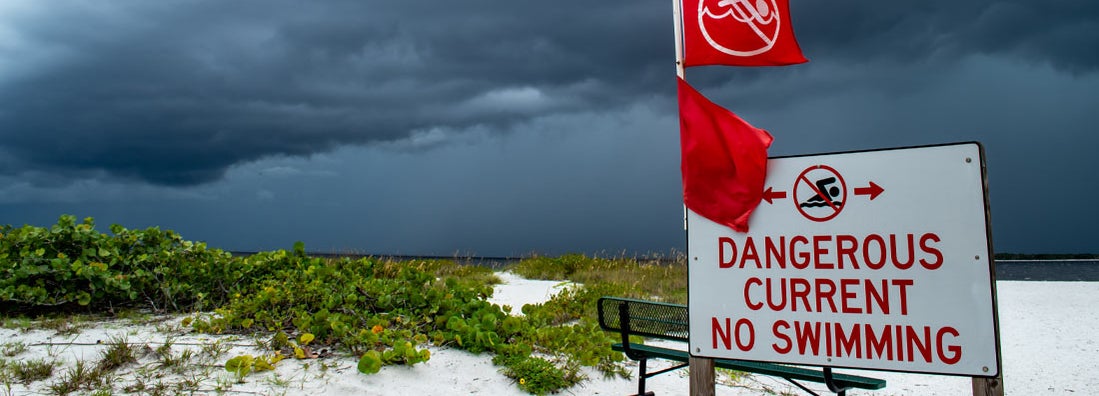Florida Hurricane Insurance
Make sure your property is suitably covered before disaster strikes.

Hurricanes are among the most damaging risks in Florida. Whether you are a homeowner, renter, or business owner, if you own property in the Sunshine State, you will want to be sure to have the right hurricane insurance in place before a storm hits.
Independent insurance agents can help you be certain that all your property, from your furniture to your vehicle, is suitably covered by the right insurance policies. Contact an insurance agent near you to get started.
What Is Hurricane Insurance and Why Is It Important in Florida?
There is no such thing as an actual, stand-alone hurricane insurance policy. Instead, coverage against hurricanes is included in the policies you already have.
Sometimes, this may mean purchasing special endorsements or adding optional coverage to your policies, and it will almost always involve supplementing the coverage you already have with flood insurance.
Florida is the most hurricane-prone state in the country. In fact, 40% of all hurricanes that impact the US have affected this state. To date, Florida has sustained damage from 120 hurricanes, 37 of which were major disasters.
Fortunately, you have access to all the coverage you need against these powerful storms.
How Much Does Hurricane Insurance Cost in Florida?
Because hurricane insurance isn’t actually a policy on its own, it is hard to put a price on it. But let’s look at the average homeowner in Florida. In order to be covered against hurricane insurance, they would need to carry a homeowners insurance policy and a flood insurance policy.
- Average cost of homeowners insurance in Florida: $1,951
- Average cost of flood insurance in Florida: $592
Added together, this comes to $2,543, which would be the average amount paid for homeowners in Florida to ensure they have sufficient hurricane insurance coverage. Of course, this total amount includes a lot of other coverage as well.
What Do Florida Homeowners Need to Know about Hurricane Insurance?
Homeowners insurance can cover your property if it is damaged by high winds or falling objects, but it does not cover flood damage. This is true even if the flood was the direct result of a covered hurricane.
Because the risk of hurricanes is so high in Florida, many insurers require property owners to purchase a special hurricane endorsement as part of their home insurance policy. Without this endorsement, damage caused by a storm that has been named a hurricane, may not be covered.
By having a comprehensive homeowners insurance policy and supplementing it with flood insurance, you can cover your property and protect your finances in a few different ways.
Homeowners insurance: This can provide coverage for hurricane-related damage to the structure of your home (dwelling coverage) and to the personal property you have inside it (contents coverage). This coverage excludes flood damage.
Your home insurance policy also includes loss of use insurance. This can cover additional living expenses if you must evacuate prior to a storm or if your house is severely damaged and you must live elsewhere while repairs are made.
Flood insurance: This is designed to cover flood damage to the structure of your home and to your personal property. These policies take 30 days to go into effect so you will want to be sure to purchase your coverage before a storm is headed your way.
Do Florida Homeowners Pay Higher Deductibles for Hurricane Damage?
In accordance with a Florida statute, insurance companies charge different, higher deductibles for hurricane-related structural damage to your home. All insurers are required to offer hurricane deductibles of $500, 2%, 5%, and 10% of the value of your home.
To be subjected to the higher deductible, the damage must be caused by a storm that has been declared a hurricane by the National Weather Service, and the damage must occur between the moment a hurricane warning or watch is issued and three days after the warning or watch ends.
What Do Florida Renters Need to Know about Hurricane Insurance?
While their risk is not as high as it is for homeowners, renters also need to protect themselves from hurricane-related losses. As a renter, you can cover your property and protect your finances with three types of coverage.
- Contents insurance: This is included in your renters insurance policy. It can cover your personal property if it is lost or damaged by a hurricane. Therefore, if the roof is torn off your apartment building and your property is damaged by wind and rain, you will receive compensation.
- Loss of use insurance: This is also included in your renters insurance policy. If you are forced to evacuate prior to a hurricane or if your building is significantly damaged and you must seek alternate housing while repairs are made, this can cover your extra living expenses.
- Flood insurance: If you live in a ground- or second-floor apartment or if you rent a house or mobile home, you may want to supplement your renters insurance with flood insurance. You can get a contents-only flood insurance policy through the National Flood Insurance Program (NFIP) at a very affordable price.
Renters are not subjected to the same hurricane-triggered higher deductibles that homeowners are. By purchasing a simple renters insurance policy and a flood insurance policy, renters in this state can cover their property against hurricanes for about $25 a month.
What Do Florida Business Owners Need to Know about Hurricane Insurance?
Florida is home to more than two million businesses. If you are among the many business owners in the Sunshine State, you can protect your business from hurricane-related losses with several types of coverage. These include the following.
- Commercial property insurance: This can cover the cost of repairing or replacing business-owned property such as merchandise, electronics, tools, and equipment if it is lost or damaged due to a hurricane.
- Business interruption insurance coverage: This can provide your business with a continuation of income if a hurricane forces it to remain closed for an extended time due to severe damage, long-lasting power outages, or road closures.
- Inland marine insurance: This can cover damage to your business-owned property when it is in transit over land or being stored away from your place of business.
- Spoilage insurance: If you own a restaurant, grocery store, or any other businesses that relies on refrigeration units to keep food or medicine fresh, a prolonged power outage following a hurricane can force you to dispose of these items. This insurance can cover your losses.
- Commercial flood insurance: This can cover the cost to repair or replace business-owned property that is lost or damaged by a flood. A flood policy through the NFIP enables your business to purchase up to $500,000 in both structural and in property coverage.
By consulting an insurance expert, you can get help making sure that your business is suitably covered against any losses a hurricane may cause.
What Do Florida Vehicle Owners Need to Know about Hurricane Insurance?
Hurricanes are hard on vehicles. Cars and trucks can be crushed under toppled trees, damaged by wind-blown objects, or washed away by floods. The good news is that hurricane-related damage to your vehicle will be covered as long as your car insurance policy includes comprehensive coverage.
Comprehensive coverage is optional, but if you are financing or leasing your car, you probably have it. Comprehensive insurance can cover your vehicle against all sorts of non-collision damage, including windstorms and floods.
Additionally, because you cannot be compensated more than your vehicle is worth, if your car is totaled by a hurricane and you owe more on your car loan than the vehicle is valued at, gap insurance can make up the difference.
Why Work with an Independent Insurance Agent in Florida?
Independent insurance agents understand your hurricane risks because they live and work in your community. These experienced professionals can help you get all the coverage you need to stay protected against these storms and other hazards, and they can make sure you are getting it a good price.
There are nearly 1,600 independent agents in Florida, so it should be easy to find one with an office near you. Arrange an obligation-free consultation with a local insurance agent to get more information.
https://www.iii.org/article/background-on-hurricane-and-windstorm-deductibles
https://climatecenter.fsu.edu/topics/hurricanes
